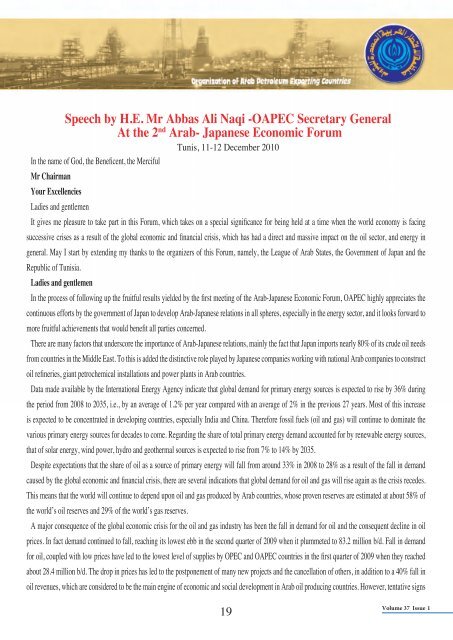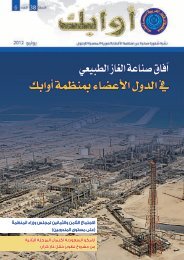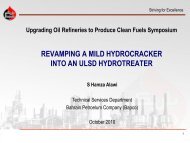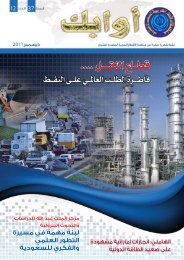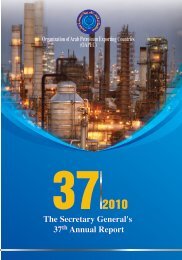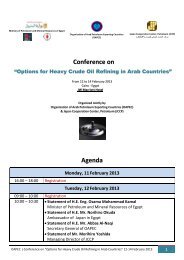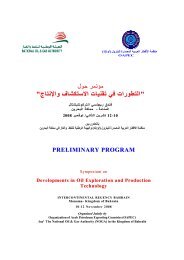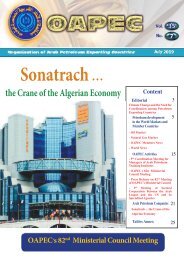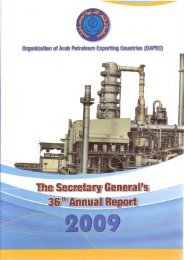Create successful ePaper yourself
Turn your PDF publications into a flip-book with our unique Google optimized e-Paper software.
Speech by H.E. Mr Abbas Ali Naqi -OAPEC Secretary GeneralAt the 2 nd Arab- Japanese Economic ForumTunis, 11-12 December 2010In the name of God, the Beneficent, the MercifulMr ChairmanYour ExcellenciesLadies and gentlemenIt gives me pleasure to take part in this Forum, which takes on a special significance for being held at a time when the world economy is facingsuccessive crises as a result of the global economic and financial crisis, which has had a direct and massive impact on the oil sector, and energy ingeneral. May I start by extending my thanks to the organizers of this Forum, namely, the League of Arab States, the Government of Japan and theRepublic of Tunisia.Ladies and gentlemenIn the process of following up the fruitful results yielded by the first meeting of the Arab-Japanese Economic Forum, OAPEC highly appreciates thecontinuous efforts by the government of Japan to develop Arab-Japanese relations in all spheres, especially in the energy sector, and it looks forward tomore fruitful achievements that would benefit all parties concerned.There are many factors that underscore the importance of Arab-Japanese relations, mainly the fact that Japan imports nearly 80% of its crude oil needsfrom countries in the Middle East. To this is added the distinctive role played by Japanese companies working with national Arab companies to constructoil refineries, giant petrochemical installations and power plants in Arab countries.Data made available by the International Energy Agency indicate that global demand for primary energy sources is expected to rise by 36% duringthe period from 2008 to 2035, i.e., by an average of 1.2% per year compared with an average of 2% in the previous 27 years. Most of this increaseis expected to be concentrated in developing countries, especially India and China. Therefore fossil fuels (oil and gas) will continue to dominate thevarious primary energy sources for decades to come. Regarding the share of total primary energy demand accounted for by renewable energy sources,that of solar energy, wind power, hydro and geothermal sources is expected to rise from 7% to 14% by 2035.Despite expectations that the share of oil as a source of primary energy will fall from around 33% in 2008 to 28% as a result of the fall in demandcaused by the global economic and financial crisis, there are several indications that global demand for oil and gas will rise again as the crisis recedes.This means that the world will continue to depend upon oil and gas produced by Arab countries, whose proven reserves are estimated at about 58% ofthe world’s oil reserves and 29% of the world’s gas reserves.A major consequence of the global economic crisis for the oil and gas industry has been the fall in demand for oil and the consequent decline in oilprices. In fact demand continued to fall, reaching its lowest ebb in the second quarter of 2009 when it plummeted to 83.2 million b/d. Fall in demandfor oil, coupled with low prices have led to the lowest level of supplies by OPEC and OAPEC countries in the first quarter of 2009 when they reachedabout 28.4 million b/d. The drop in prices has led to the postponement of many new projects and the cancellation of others, in addition to a 40% fall inoil revenues, which are considered to be the main engine of economic and social development in Arab oil producing countries. However, tentative signs19Volume 37 Issue 1


